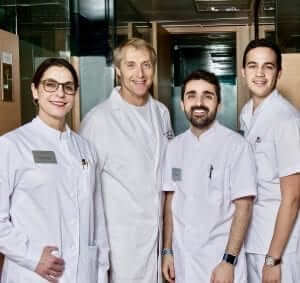Endodontics
What is Endodontics?
An endodontist is the dentist who specializes in endodontics or canals / canals, that is, the specialist in removing (“killing”) the nerve of a tooth. The most indicated specialist in treating acute dental pain that “does not let us live.”
Endodontic treatments aim to keep the tooth in the mouth.
Our Treatments
It’s the typical unbearable toothache! The one that makes us run to visit the dentist.
Endodontic treatment treats the inside of the tooth. Inside the tooth there is a soft tissue called the pulp, necessary for the growth and development of the tooth. The pulp contains blood vessels, nerves, and connective tissue. It extends from the dental crown to the tip of the roots, where it connects with the bone that surrounds the tooth. The pulp can be affected mainly by cavities, trauma and dental wear causing its necrosis (death). In these cases, infection, pain, inflammation appear in the bone and gum that surround the tooth.
Endodontics cures these infections by eliminating the necrotic pulp, disinfecting the space it occupies and filling it with suitable materials that ensure a good seal.
With proper treatment, endodontic teeth can last a lifetime along with the advantages that this entails:
- Natural appearance
- Efficient chewing
- Normal strength and sensation when biting
- Protect other teeth from excessive wear or stress
It is the treatment necessary to save a tooth in which a previous endodontic treatment has failed.
It may be the case that a properly treated root canal tooth does not heal as expected or it may
develop new problems. In these cases the pain and inflammation appear again months or years after the
initial treatment. This can occur as with any other dental or medical procedure for several
reasons, including:
- Narrow or curved root canals were not treated during the initial procedure.
- The anatomy of the interior of the tooth is complicated and was not detected in the first procedure.
- The placement of the dental crown or other restoration was delayed after endodontic treatment.
- The restoration did not prevent salivary contamination inside the tooth, due to a defective sealing of its margins
In other cases, a new problem can jeopardize a tooth that was successfully treated. For example:
- A new caries can expose the canal filling material to bacteria, causing a new infection in the tooth.
- Bone infection appearance around the roots of the tooth.
- A loose, cracked, or broken crown or filling can expose the tooth to new infection.
- A dental fracture.
- Sometimes we come across situations in which optimization of an existing root canal treatment is advised, even if there are no discomforts. These are cases in which the placement of a new crown, bridge, inlay or filling is required and there is uncertainty about the internal state of the tooth. The goal is to minimize the risk of later complications.
If your tooth does not heal or develops new problems, you have a second chance. An additional root canal procedure may be able to achieve healing and thus save your tooth.
During retreatment, the endodontist will reopen the tooth and remove the filling materials that were placed inside it during the first procedure so that the inside of the tooth can be carefully examined for additional channels or a new infection. After disinfecting and deeply cleaning the inside of the tooth along its entire length.
Leaving this space perfectly filled and sealed. The access is filled with temporary material. After a short time, a definitive filling is necessary with a perfect peripheral seal and, as indicated by the dentist, a new crown or inlay.
Periapical surgery is indicated when there is a periapical lesion, that is, an infection in the surrounding bone
the roots of the tooth.
Before performing this surgery, it is necessary to perform the root canal of the affected tooth.
The surgical procedure consists of the removal of the infected tissue, the resection of the root apex (we remove approximately 1/3 of the root tip) and the obturation of the apical end of the root canal, seeking the perfect sealing of the tooth. It is performed under local anesthesia. It requires antibiotic and anti-inflammatory treatment after surgery.
Likewise, periodic radiographic controls are necessary to assess the healing of the bone lesion.
Endodontic treatments are currently being performed on teeth that we know we are going to exodont (remove from the mouth) but have a bone infection, and we do so with the aim of seeking bone healing and the creation of new bone, ensuring a better prognosis than other treatments dental (implant placement, bone grafts …)
Endodontic treatment aimed at the preservation of a young permanent tooth in which the pulp has become necrotic and the formation of the root has not yet finished.
It is needed by children who have suffered a tooth fracture or very deep cavities.
After the endodontic treatment is finished and the tooth has been restored, it will function like any other tooth.
Relatively novel treatment through which we seek to maintain vital dental pulp.
It is important to correctly select the clinical cases where to perform it.
What problems does it solve?
Dental Pain
Abscesses, phlegmons, dental fistulas
Broken or fallen teeth.
Upper or Lower Jaw Bone Infections.
Loss of natural teeth.
Dental fistulas
Our Recommendations
Why have an operation at Birbe Clinic?
We are specialists in designing faces and smiles.
At Birbe Clinic we have a great team, mentored by Dr. Joan Birbe, with more than 20 years of experience treating patients; always up to date with news and selecting the innovations that really bring improvements to our treatments. As in the case of virtual simulations of facial surgeries, intraoral scanners, customization of facial prostheses, the use of the microscope, etc.
Testimonials
Our priority is to achieve excellence in treatment. All this with a personalized, honest and trustworthy treatment. In addition, our facilities offer maximum hygiene, sterilization and comfort.
Find out what they think of us!
We help you carry out the intervention you need
After a rigorous evaluation we will offer you a personalized and closed estimate with all the necessary forms of payment and financing, so that you can carry it out.
Contact Us
Contact us during our business hours of:
- Monday, Thursday and Friday from 8.00h to 16.00h.
- Tuesday and Wednesday from 8.00h to 18.00h.
- Phone Number: +34 93 212 47 37.
Outside of our business hours you can send us a WhatsApp or a form and we will answer you as soon as possible. Being located in Barcelona, we receive patients from all over the national and international territory.
During your first consultation we will provide you with:
✔ Personal diagnosis by oral and facial examination.
✔ Closed estimate with different financing possibilities.





